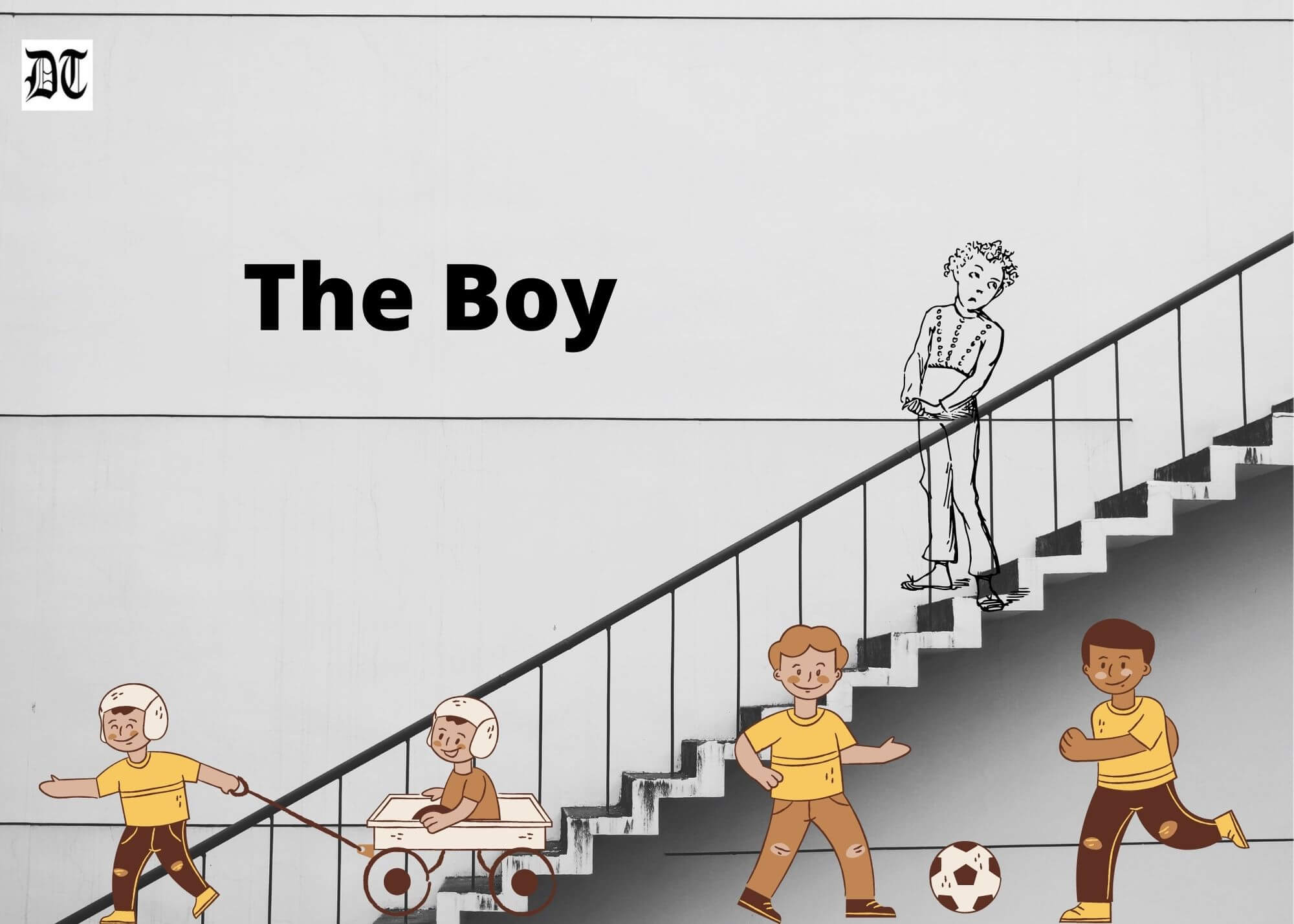Soumya profiles a faceless child, the Boy, and tells us about his playdate. An exclusive for Different Truths.

We go back to the boy’s childhood. But wait, it looks rather weird calling him the ‘Boy’. This was what the burra sahibs condescendingly called waiters in restaurants in the old days when political correctness was unknown. Or, worse, what racist white colonial types called their darker-hued subjects. So, Boy goes, but the problem remains, what to call him? His anonymity is important, as he represents a milieu, not an individual. As a compromise solution, let us name him Boy.
But wait, it looks rather weird calling him the ‘Boy’. This was what the burra sahibs condescendingly called waiters in restaurants in the old days when political correctness was unknown. Or, worse, what racist white colonial types called their darker-hued subjects. So, Boy goes, but the problem remains, what to call him? His anonymity is important, as he represents a milieu, not an individual.
He is being taught how to socialise. He is occasionally going on play dates to neighbouring houses with kids, especially when the parents are not at home. He would have preferred being home and having his babysitter read to him, but sometimes the help had other chores to do and were happier when the Boy was not around.
They were staying in a respectable middle-class neighbourhood, which meant that the people were mostly house owners, who have lived there for generations and were deeply conservative.
The Boy was a little frightened of the other kids, who all knew each other, and ragged the new entrant from an alien state. He was also frightened of their parents, who pestered him with many questions and said things he could not quite follow, but the way they sniggered made him uncomfortable.
The Boy was a little frightened of the other kids, who all knew each other, and ragged the new entrant from an alien state. He was also frightened of their parents, who pestered him with many questions and said things he could not quite follow, but the way they sniggered made him uncomfortable.
These people were curious and a little critical of their new neighbours from the big city and their strange ways.
The Boy’s mother did not mix too intimately with these people. Her crowd was artier, having professional musicians, amateur thespians, and wannabe writers. She was a talented musician and writer herself and organised many cultural does and musical soirees. Some of the regulars later went on to become national and international icons in their fields.

Boy’s father worked for a British company, and as per their corporate culture, an occasional cocktail party was thrown. People of various communities and both genders gathered, which had a sprinkling of Europeans too, alcohol was served, and music was played, and who knows, maybe there was dancing!
But to the neighbours, this was a bohemian gathering of mixed gender, where music, animated conversation and loud laughter were heard. Eyebrows, therefore, were raised. Boy’s father worked for a British company, and as per their corporate culture, an occasional cocktail party was thrown. People of various communities and both genders gathered, which had a sprinkling of Europeans too, alcohol was served, and music was played, and who knows, maybe there was dancing! And Boy’s mother, instead of condemning her husband’s wayward ways, played hostess! The combined eyebrows of the neighbourhood almost leapt out of their heads.
As they dare not question their younger, hipper, and more affluent neighbours from the big city, Boy faces the brunt of their curiosity and disapproval.
As they dare not question their younger, hipper, and more affluent neighbours from the big city, Boy faces the brunt of their curiosity and disapproval.
“What happens at those parties, my child? Are coloured sherbets served? Does your mummy have them too? Do they dance? Do people fall? Do those singers and young men come even when your papa is not around? What do they do? Are you sent away?” The boy is bewildered. He can sense the implied criticism but does not understand why. He cannot fathom what such normal activities can be of such prurient curiosity of the aunties. He resents the grilling but is unable to escape.
Boy thoroughly enjoys these gatherings as he is much fussed over. He is indulged by his parents and the centre of attraction at these parties. He even sings on stage, once accompanied by a flautist who is a household name today.
Not everyone is enamoured by him though. An English upper-class guest, who believed like most of his generation that children should be seen and not heard, and should not be present in social gatherings for grownups, was annoyed at Boy’s frankly expressed wonder at his height, and commented on his poor manners.
Not everyone is enamoured by him though. An English upper-class guest, who believed like most of his generation that children should be seen and not heard, and should not be present in social gatherings for grownups, was annoyed at Boy’s frankly expressed wonder at his height, and commented on his poor manners. Noticing his crestfallen face, Boy’s father makes it clear to the guest that this is perfectly acceptable behaviour in India.
On other occasions, he is the star of the show. His name was difficult to pronounce for foreigners, and once when he was asked to repeat it a few times, Boy ran and returned with a mug engraved with his name. As he had not started playschool then and was yet to learn how to read, this quick wit was commented upon by the assembled guests, who pronounced him a genius. This was happily endorsed by the fond parents, and Boy grew up firmly convinced of this fact. This, along with his addiction to stories, resulted in academic and later career performance, which proved the exact opposite.
But we digress again. Although we had agreed that memory is an unruly self-willed beast, and is impossible to control, we must maintain a semblance of order. So, we finally go back to the play date.
The kids played ‘statue’, and they forgot to unfreeze him. Or they played hide and seek, where he was never found. And when he was the seeker, the group escaped to some other house, and he could find none, thus being left in the clutches of the aunties again, undergoing the grilling.

The kids played ‘statue’, and they forgot to unfreeze him. Or they played hide and seek, where he was never found. And when he was the seeker, the group escaped to some other house, and he could find none, thus being left in the clutches of the aunties again, undergoing the grilling.
Sometimes he was taken out by the canal to play cricket. He was told to stand in one place and not move whatever happened. He enjoyed this better and stood and dreamed, while the kids carried out strange rituals. He was told that he was a fielder or spectator or lamppost or whatever. The role suited him.
One day, someone spotted a snake in the field. An alarm was raised, and all the kids ran away. But none had remembered to call Boy. Boy was an obedient kid and stood firmly in place without moving until he was told. He thought that this was some part of the mysterious rituals of this thing called cricket.
One day, someone spotted a snake in the field. An alarm was raised, and all the kids ran away. But none had remembered to call Boy. Boy was an obedient kid and stood firmly in place without moving until he was told. He thought that this was some part of the mysterious rituals of this thing called cricket. In any case, he was used to being left alone when the other kids ran away. He also did not know what a snake was and that it was considered dangerous. He stood still and curiously watched the strange creature wriggling away. The snake may have been harmless, and in any case, would not disturb someone unless it itself was disturbed, and soon disappeared. The other kids came back and berated Boy for staying there like an idiot. They made him promise not to tell his parents, which of course he promptly did, describing this creature called a snake with great excitement.
The major gain from this adventure was the edict that he was not to be left unsupervised with the other kids. The babysitter was berated for his lapse and was always told to shadow Boy. The minus side was that they decided to enrol Boy in a preschool kindergarten. But we will go into those nightmares in the future.
Visuals by Different Truths





 By
By


 By
By